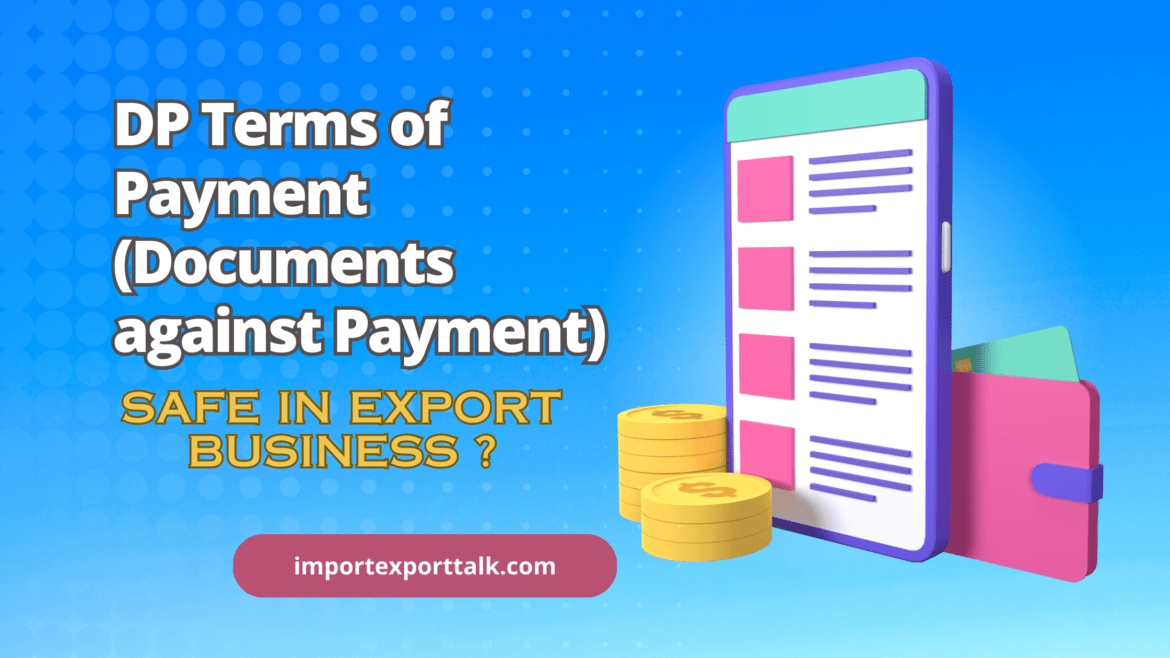Table of Contents
In the context of international trade, the security of DP terms of payment (Documents against Payment) is extremely important. In addition to introducing DP terminology, this part emphasizes the value of safe payment procedures for export endeavors.
Understanding DP terms of payment
When exporting goods or services internationally, it is essential for firms to comprehend the terms of DP (Documents against Payment). The purpose of this part is to explore the nuances of DP terminology, providing clarification on its meaning, workings, and operational features:
DP, also known as Documents against Payment, is a method of payment in international trade where the seller forwards shipping documents to the buyer’s bank. The invoice, bill of lading, and other necessary papers are among these documents. However, these documents are only given to the buyer when the products are paid for.
Mechanism of DP Transactions:
In standing a DP transaction, the exporter ships the products and gets ready the required paperwork, which is then sent to their bank. These documents are received by the buyer’s bank, which retains them until the buyer satisfies the payment obligation. The buyer can claim the documentation and assume ownership of the goods once payment has been made or guaranteed.
Functioning in International Trade Transactions:
The seller and the buyer are provided with a certain amount of protection when using DP terms as a secure payment option. It guarantees payment to the vendor before the buyer takes possession of the items. It gives the buyer the guarantee that, following payment, they will get the paperwork they need to assert ownership of the goods.
Documentation and Compliance:
In DP transactions, proper documentation and adherence to mutually agreed agreements are essential. These include making sure that all paperwork is accurate, that deadlines are met, and that the terms and conditions outlined in the trade contract are followed.
Safety Considerations in DP Transactions
Ensuring the safety and security of transactions involving Documents against Payment (DP transactions) is of utmost importance to all stakeholders engaged in global trade.
Risk Assessment and Mitigation:
It is essential to evaluate and comprehend the risks associated with DP transactions. Risks could include possible fraud, paperwork inconsistencies, or nonpayment or delayed payment by the buyer. These risks can be reduced with the use of risk mitigation techniques such comprehensive due diligence, buyer credibility checks, and explicit contractual terms.
Payment Assurance and Trust:
It is crucial for the seller to guarantee payment before relinquishing possession of the shipment paperwork. Although it is crucial, the parties must strictly comply to the terms and circumstances that have been agreed upon. To prevent any possible conflicts or problems, all parties must have faith in the transaction process.
The major goals of safety concerns in DP transactions are risk mitigation, precise documentation, upholding compliance and trust, and strong contractual agreements. Following these guidelines makes DP transactions more dependable and secure, which facilitates easier and safer international trade transactions for importers and exporters.
Advantages of DP terms of payment in Export Business
DP (Documents against Payment) terms in export business offer several advantages for both the seller (exporter) and the buyer (importer). The following section explains the advantages of using DP terms in cross-border commerce transactions:
- Cost and Time Efficiency: DP terms frequently speed up transactions, cutting down on related expenses and administrative procedures. It facilitates a more efficient flow of goods because the seller can start shipping as soon as they receive payment confirmation or payment guarantee.
- Secure Transaction Mode: DP terms provide the seller with a safe way to make payments. Before giving the seller possession of the shipment paperwork, they make sure the seller is paid or has assurance of payment. This gives the seller a certain amount of assurance by lowering the possibility of nonpayment or delayed payment.
- Flexible Payment Options: Payment alternatives may be flexible under DP circumstances. Sellers may agree to different payment arrangements, such as cash on delivery of documents or acceptance drafts, contingent on the degree of mutual trust that has been built between the parties.
- Reduced Financial Risks for Buyers: DP terms are advantageous to buyers since, following payment, they become the owners of the shipment documents. This guarantees purchasers that, upon satisfying their financial commitments, they will obtain the paperwork required to assert ownership of the merchandise.
- Adaptability to Certain Markets: Employing these terms can help the exporter become more competitive in markets or industries where DP terminology are widely accepted and favored. It facilitates more seamless transactions by conforming to the requirements of specific buyers or locations.
Disadvantages of DP terms of payment in Export Business
While DP (Documents against Payment) arrangements have several benefits, companies involved in international trade should be aware of the following drawbacks or disadvantages:
- Limited Control for the Seller: The seller surrenders ownership of the shipment paperwork to the buyer’s bank until payment is received or guaranteed, which is one of the main drawbacks of DP terms. This loss of control over the documents could be dangerous, particularly if the buyer doesn’t pay or pays late.
- Potential Risks for the Buyer: When it comes to the buyer, DP terms can be risky if the seller doesn’t follow through on their end of the bargain or if there are errors or inconsistencies in the paperwork. It may result in difficulties clearing customs or delays in receiving title of the goods.
- Complex Dispute Resolution: In DP transactions, dispute resolution can be difficult and time-consuming. Protracted dispute resolution procedures may result from disagreements over payment terms, inconsistencies in supporting documents, or problems with received items.
- Potential Impact on Cash Flow: Relying on DP terms could have an effect on the seller’s cash flow because they have to wait to get the funds till they receive payment or payment guarantee. Payment delays can have an impact on an exporter’s ability to make ends meet.
- Exposure to Currency Risks: Currency risks are included in DP transactions for both the buyer and the seller. The value of the products and the actual payment received or made may be impacted by fluctuations in exchange rates between the currencies of the supplier and the buyer during the transaction period.
DP Terms vs. Other Payment Methods
Businesses can evaluate the pros, cons, and applicability of each option by comparing alternative payment methods in international trade with DP (Documents against Payment) conditions. This section compares DP terms to other widely used payment options:
1. DP Terms vs. Documentary Collections:
- DP Terms: In DP transactions, shipment documents are released to the buyer by the seller following payment or payment guarantee. It requires a certain amount of mutual confidence between the parties.
- Letter of Credit (LC): A Letter of Credit is a document issued by the buyer’s bank that guarantees payment to the seller subject to certain fulfillment requirements. Both parties benefit from increased security because the bank guarantees the payment.
2. DP Terms vs. Advance Payment:
- DP Terms: With DP, shipment documents are released following payment or payment guarantee, providing a measure of protection for both sides.
- Advance Payment: Payment in advance requires the customer to pay the vendor prior to shipment, providing additional protection for the seller but also putting the buyer at risk in the event that the items do not meet expectations.
3. DP Terms vs. Open Account:
- DP Terms: With DP, the seller loses custody of the papers until payment is received, but shipment documents are released upon payment, lowering risks for all parties.
- Open Account: Open Account terms involve the seller shipping the products and sending the buyer an invoice with a deferred payment schedule. This increases the seller’s risk but gives the buyer convenience.
4. DP Terms vs. Cash in Advance:
- DP Terms: DP provides protection for both parties by releasing cargo documentation after payment. But the seller must have faith that the buyer will pay on schedule.
- Cash in Advance: Cash in advance gives the seller more protection by allowing the buyer to pay before the seller ships the items, but it also requires the buyer’s trust.
5. DP Terms vs. Documentary Collections:
- DP Terms: Under DP, the seller releases shipment documentation as soon as payment is received. This lowers risk but may also result in delays if there are document errors or problems with payments.
- Documentary Collections: This approach, which provides less protection than open account conditions but more than a letter of credit, involves the buyer receiving shipping documentation from their bank in exchange for payment or acceptance of a draft.
Safety Measures and Best Practices
- Due Diligence and Verification: Make sure you investigate the buyer’s reputation, creditworthiness, and previous trading history in detail. Check the buyer’s references, solvency, and compliance with trade agreements.
- Clear and Detailed Contracts: Make sure the contracts are thorough and unambiguous, detailing the conditions, obligations, and responsibilities of each party. Provide information about the shipping, the necessary paperwork, the terms of payment, and the dispute resolution procedures.
- Documentary Accuracy and Compliance: Verify that all shipment documentation are accurate, comprehensive, and compliant with all applicable international trade laws and agreed-upon agreements. Errors or inconsistencies may cause delays or arguments.
- Financial Institutions and Intermediaries: Involve trustworthy middlemen and financial institutions to help with DP transactions. An extra degree of security can be added to the transaction by banks with a track record of dependable service and knowledge of international trading.
- Expert Consultation and Legal Advice: Consult with trade advisors or attorneys who specialize in international trade for knowledgeable guidance. Their advice can help ensure compliance with legal obligations and navigate complicated trade restrictions.
The need of safe and secure DP transactions is emphasized in the conclusion, which acts as a short yet powerful summation. For the benefit of all parties concerned, it emphasizes how important it is to apply best practices and adhere to safety precautions in international commerce relations.
Exchange Rate of Currency Effect Export Business
Global Trade with CPT IncoTerms 2020
To further your understanding of international trade and Incoterms :
- International Chamber of Commerce (ICC): Incoterms® 2020
- World Trade Organization (WTO): International Trade and COVID-19
- United Nations Conference on Trade and Development (UNCTAD): Trade and Development
- Trade Associations and Chambers of Commerce

